Organisational Behaviour Report: Waitrose - Culture, Motivation, Teams
VerifiedAdded on 2023/01/10
|18
|5673
|70
Report
AI Summary
This report provides a detailed analysis of organisational behaviour within Waitrose, a major UK retailer. It explores the influence of culture, power, and politics on individual and team behaviour, examining models such as the Charles Handy Model and the French and Raven model. The report evaluates motivational theories, including intrinsic and extrinsic motivation, and delves into content and process theories, such as Maslow's Hierarchy of Needs. It also compares effective and ineffective team formation, referencing Tuckman's theory of team development. Finally, the report applies concepts and philosophies of organisational behaviour to a given business situation, providing a comprehensive overview of how these elements impact employee performance and overall organisational success. The report is structured around the unit's learning outcomes (LO1-LO4) and includes critical evaluations and practical applications of the concepts discussed.
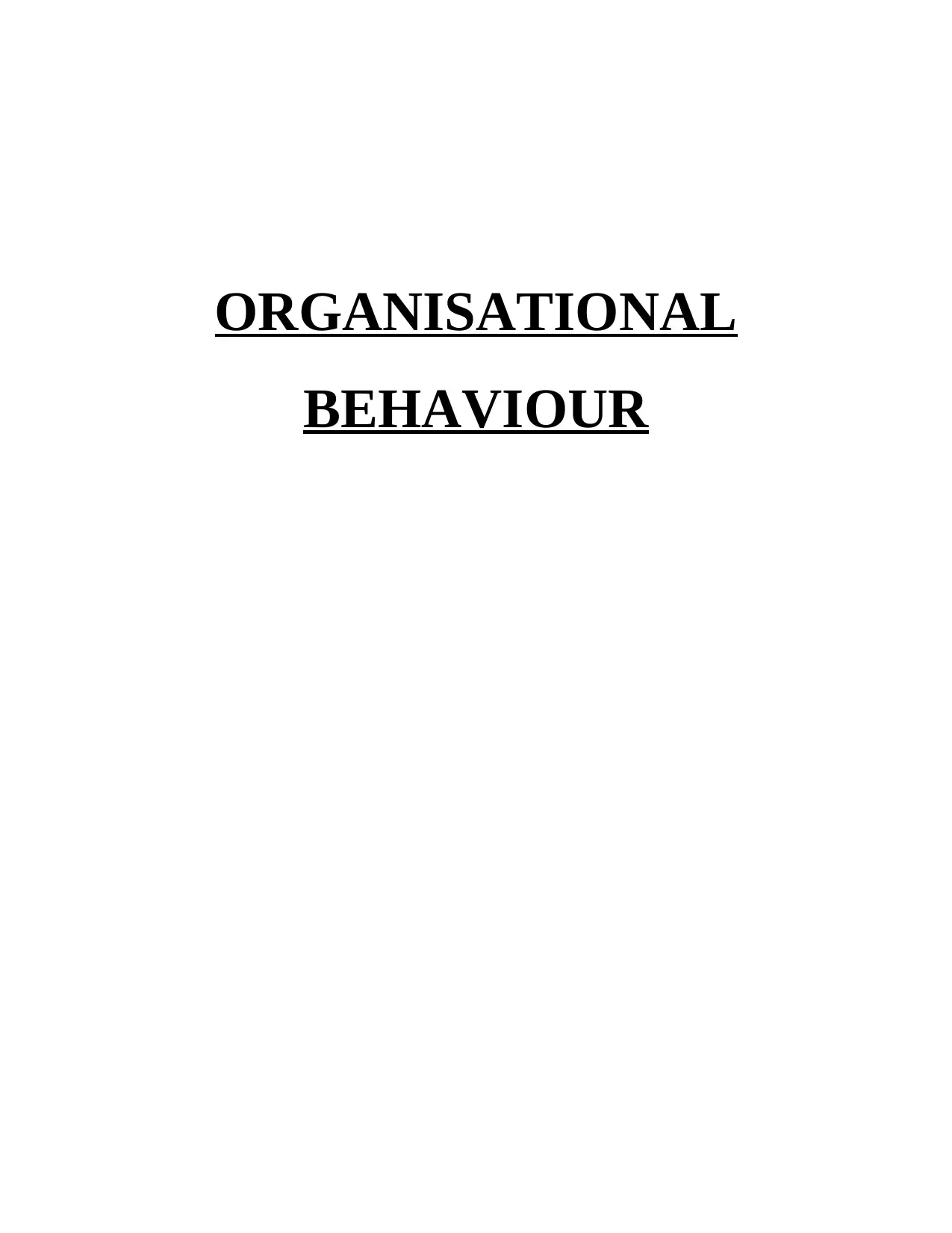
ORGANISATIONAL
BEHAVIOUR
BEHAVIOUR
Paraphrase This Document
Need a fresh take? Get an instant paraphrase of this document with our AI Paraphraser
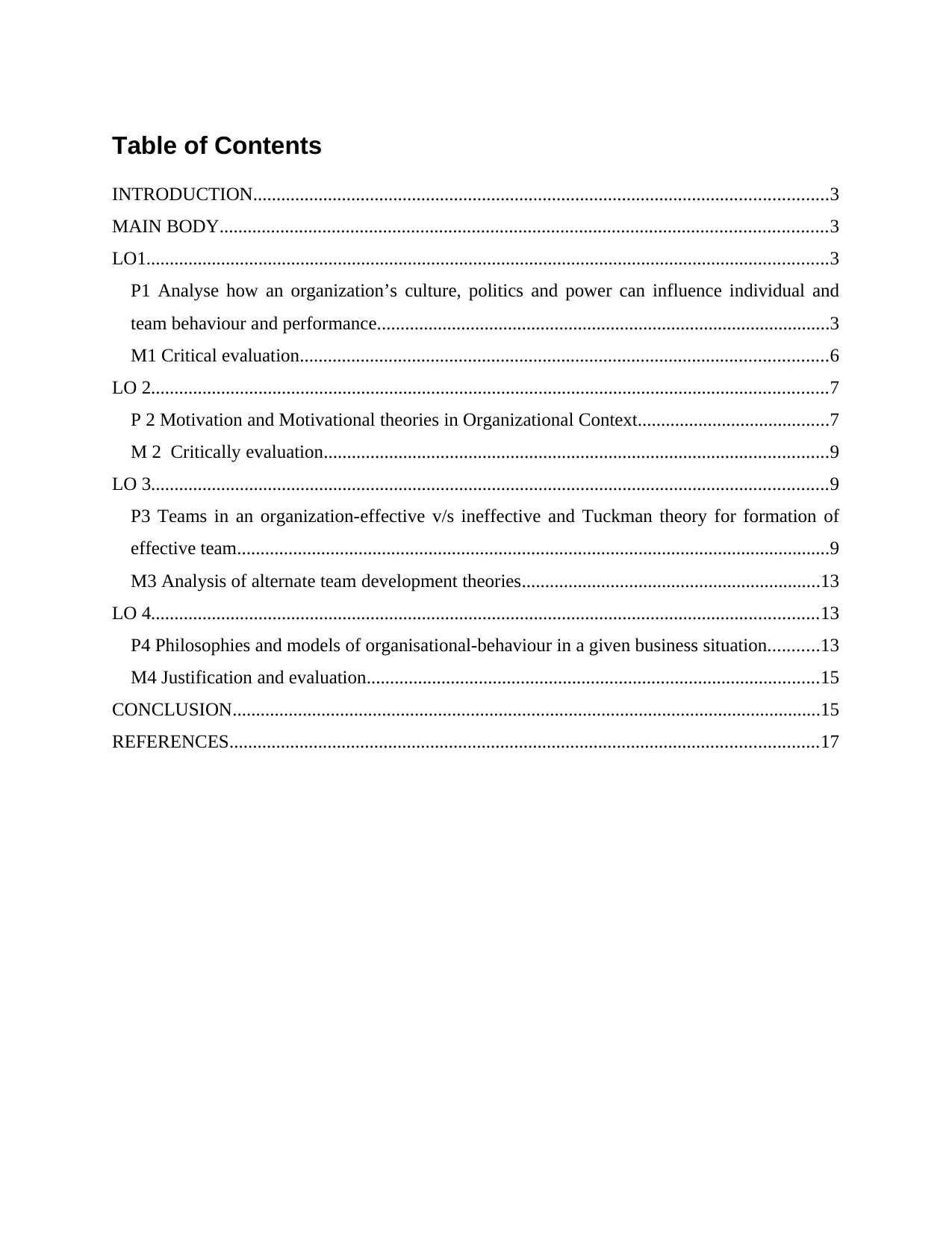
Table of Contents
INTRODUCTION...........................................................................................................................3
MAIN BODY..................................................................................................................................3
LO1..................................................................................................................................................3
P1 Analyse how an organization’s culture, politics and power can influence individual and
team behaviour and performance.................................................................................................3
M1 Critical evaluation.................................................................................................................6
LO 2.................................................................................................................................................7
P 2 Motivation and Motivational theories in Organizational Context.........................................7
M 2 Critically evaluation............................................................................................................9
LO 3.................................................................................................................................................9
P3 Teams in an organization-effective v/s ineffective and Tuckman theory for formation of
effective team...............................................................................................................................9
M3 Analysis of alternate team development theories................................................................13
LO 4...............................................................................................................................................13
P4 Philosophies and models of organisational-behaviour in a given business situation...........13
M4 Justification and evaluation.................................................................................................15
CONCLUSION..............................................................................................................................15
REFERENCES..............................................................................................................................17
INTRODUCTION...........................................................................................................................3
MAIN BODY..................................................................................................................................3
LO1..................................................................................................................................................3
P1 Analyse how an organization’s culture, politics and power can influence individual and
team behaviour and performance.................................................................................................3
M1 Critical evaluation.................................................................................................................6
LO 2.................................................................................................................................................7
P 2 Motivation and Motivational theories in Organizational Context.........................................7
M 2 Critically evaluation............................................................................................................9
LO 3.................................................................................................................................................9
P3 Teams in an organization-effective v/s ineffective and Tuckman theory for formation of
effective team...............................................................................................................................9
M3 Analysis of alternate team development theories................................................................13
LO 4...............................................................................................................................................13
P4 Philosophies and models of organisational-behaviour in a given business situation...........13
M4 Justification and evaluation.................................................................................................15
CONCLUSION..............................................................................................................................15
REFERENCES..............................................................................................................................17
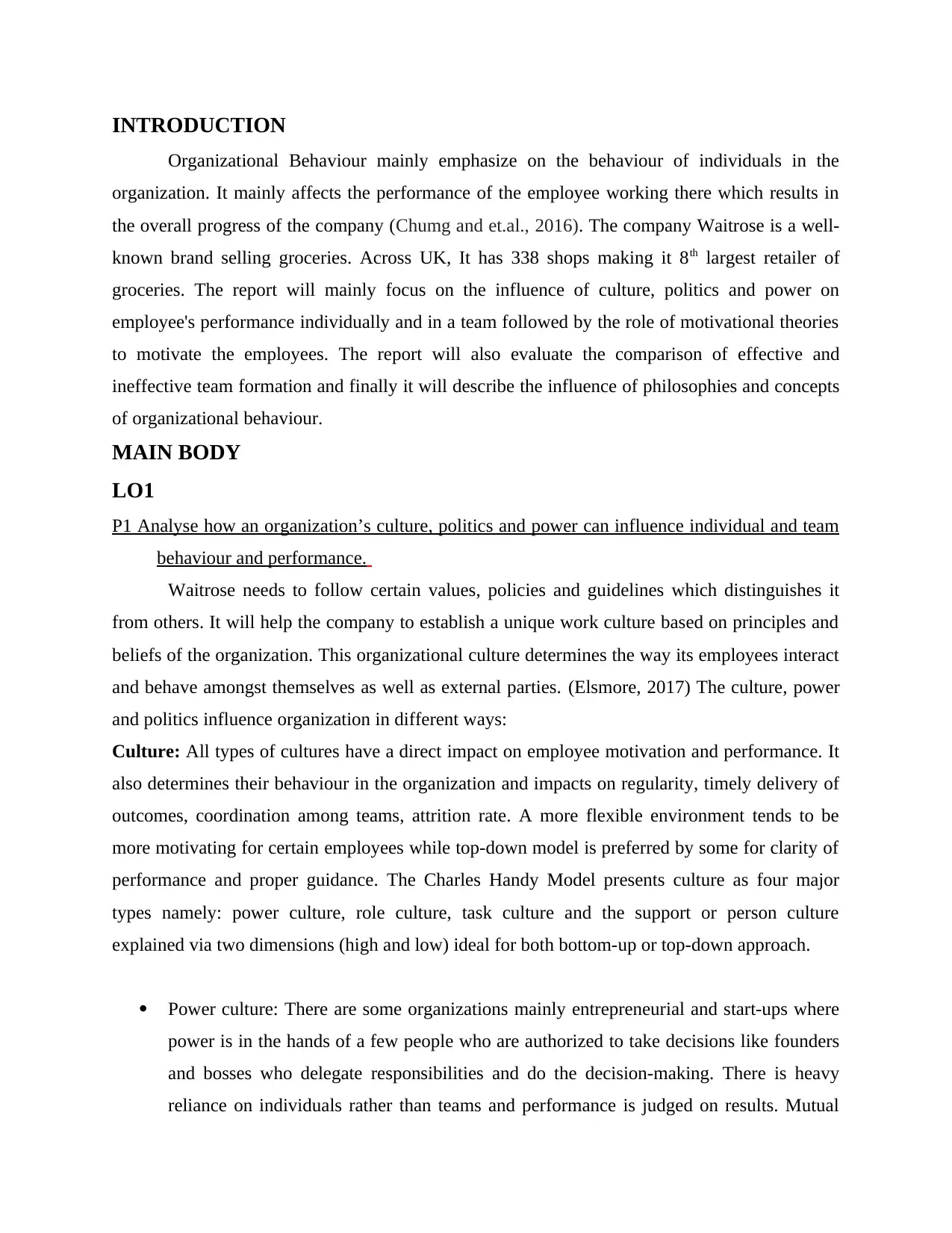
INTRODUCTION
Organizational Behaviour mainly emphasize on the behaviour of individuals in the
organization. It mainly affects the performance of the employee working there which results in
the overall progress of the company (Chumg and et.al., 2016). The company Waitrose is a well-
known brand selling groceries. Across UK, It has 338 shops making it 8th largest retailer of
groceries. The report will mainly focus on the influence of culture, politics and power on
employee's performance individually and in a team followed by the role of motivational theories
to motivate the employees. The report will also evaluate the comparison of effective and
ineffective team formation and finally it will describe the influence of philosophies and concepts
of organizational behaviour.
MAIN BODY
LO1
P1 Analyse how an organization’s culture, politics and power can influence individual and team
behaviour and performance.
Waitrose needs to follow certain values, policies and guidelines which distinguishes it
from others. It will help the company to establish a unique work culture based on principles and
beliefs of the organization. This organizational culture determines the way its employees interact
and behave amongst themselves as well as external parties. (Elsmore, 2017) The culture, power
and politics influence organization in different ways:
Culture: All types of cultures have a direct impact on employee motivation and performance. It
also determines their behaviour in the organization and impacts on regularity, timely delivery of
outcomes, coordination among teams, attrition rate. A more flexible environment tends to be
more motivating for certain employees while top-down model is preferred by some for clarity of
performance and proper guidance. The Charles Handy Model presents culture as four major
types namely: power culture, role culture, task culture and the support or person culture
explained via two dimensions (high and low) ideal for both bottom-up or top-down approach.
Power culture: There are some organizations mainly entrepreneurial and start-ups where
power is in the hands of a few people who are authorized to take decisions like founders
and bosses who delegate responsibilities and do the decision-making. There is heavy
reliance on individuals rather than teams and performance is judged on results. Mutual
Organizational Behaviour mainly emphasize on the behaviour of individuals in the
organization. It mainly affects the performance of the employee working there which results in
the overall progress of the company (Chumg and et.al., 2016). The company Waitrose is a well-
known brand selling groceries. Across UK, It has 338 shops making it 8th largest retailer of
groceries. The report will mainly focus on the influence of culture, politics and power on
employee's performance individually and in a team followed by the role of motivational theories
to motivate the employees. The report will also evaluate the comparison of effective and
ineffective team formation and finally it will describe the influence of philosophies and concepts
of organizational behaviour.
MAIN BODY
LO1
P1 Analyse how an organization’s culture, politics and power can influence individual and team
behaviour and performance.
Waitrose needs to follow certain values, policies and guidelines which distinguishes it
from others. It will help the company to establish a unique work culture based on principles and
beliefs of the organization. This organizational culture determines the way its employees interact
and behave amongst themselves as well as external parties. (Elsmore, 2017) The culture, power
and politics influence organization in different ways:
Culture: All types of cultures have a direct impact on employee motivation and performance. It
also determines their behaviour in the organization and impacts on regularity, timely delivery of
outcomes, coordination among teams, attrition rate. A more flexible environment tends to be
more motivating for certain employees while top-down model is preferred by some for clarity of
performance and proper guidance. The Charles Handy Model presents culture as four major
types namely: power culture, role culture, task culture and the support or person culture
explained via two dimensions (high and low) ideal for both bottom-up or top-down approach.
Power culture: There are some organizations mainly entrepreneurial and start-ups where
power is in the hands of a few people who are authorized to take decisions like founders
and bosses who delegate responsibilities and do the decision-making. There is heavy
reliance on individuals rather than teams and performance is judged on results. Mutual
⊘ This is a preview!⊘
Do you want full access?
Subscribe today to unlock all pages.

Trusted by 1+ million students worldwide
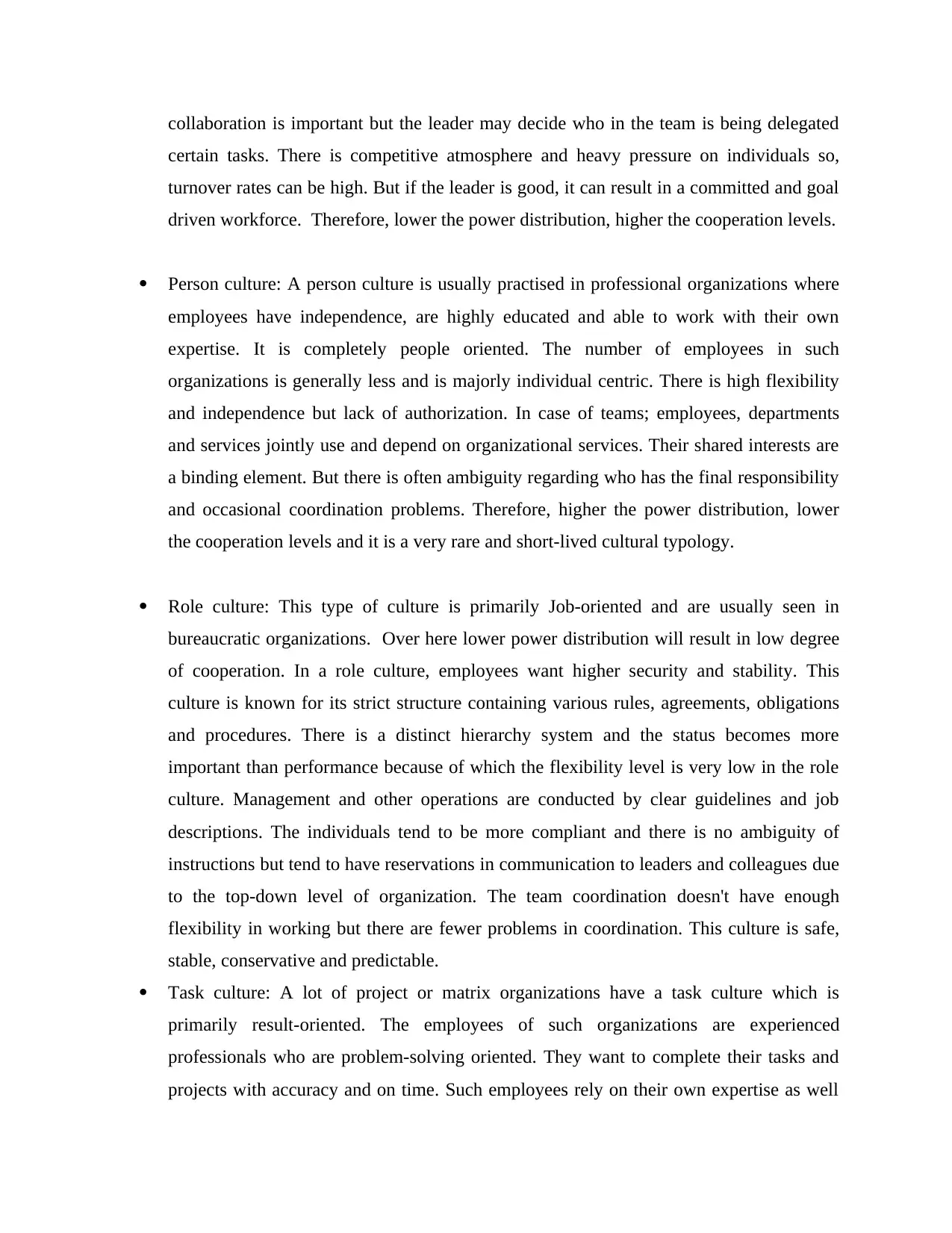
collaboration is important but the leader may decide who in the team is being delegated
certain tasks. There is competitive atmosphere and heavy pressure on individuals so,
turnover rates can be high. But if the leader is good, it can result in a committed and goal
driven workforce. Therefore, lower the power distribution, higher the cooperation levels.
Person culture: A person culture is usually practised in professional organizations where
employees have independence, are highly educated and able to work with their own
expertise. It is completely people oriented. The number of employees in such
organizations is generally less and is majorly individual centric. There is high flexibility
and independence but lack of authorization. In case of teams; employees, departments
and services jointly use and depend on organizational services. Their shared interests are
a binding element. But there is often ambiguity regarding who has the final responsibility
and occasional coordination problems. Therefore, higher the power distribution, lower
the cooperation levels and it is a very rare and short-lived cultural typology.
Role culture: This type of culture is primarily Job-oriented and are usually seen in
bureaucratic organizations. Over here lower power distribution will result in low degree
of cooperation. In a role culture, employees want higher security and stability. This
culture is known for its strict structure containing various rules, agreements, obligations
and procedures. There is a distinct hierarchy system and the status becomes more
important than performance because of which the flexibility level is very low in the role
culture. Management and other operations are conducted by clear guidelines and job
descriptions. The individuals tend to be more compliant and there is no ambiguity of
instructions but tend to have reservations in communication to leaders and colleagues due
to the top-down level of organization. The team coordination doesn't have enough
flexibility in working but there are fewer problems in coordination. This culture is safe,
stable, conservative and predictable.
Task culture: A lot of project or matrix organizations have a task culture which is
primarily result-oriented. The employees of such organizations are experienced
professionals who are problem-solving oriented. They want to complete their tasks and
projects with accuracy and on time. Such employees rely on their own expertise as well
certain tasks. There is competitive atmosphere and heavy pressure on individuals so,
turnover rates can be high. But if the leader is good, it can result in a committed and goal
driven workforce. Therefore, lower the power distribution, higher the cooperation levels.
Person culture: A person culture is usually practised in professional organizations where
employees have independence, are highly educated and able to work with their own
expertise. It is completely people oriented. The number of employees in such
organizations is generally less and is majorly individual centric. There is high flexibility
and independence but lack of authorization. In case of teams; employees, departments
and services jointly use and depend on organizational services. Their shared interests are
a binding element. But there is often ambiguity regarding who has the final responsibility
and occasional coordination problems. Therefore, higher the power distribution, lower
the cooperation levels and it is a very rare and short-lived cultural typology.
Role culture: This type of culture is primarily Job-oriented and are usually seen in
bureaucratic organizations. Over here lower power distribution will result in low degree
of cooperation. In a role culture, employees want higher security and stability. This
culture is known for its strict structure containing various rules, agreements, obligations
and procedures. There is a distinct hierarchy system and the status becomes more
important than performance because of which the flexibility level is very low in the role
culture. Management and other operations are conducted by clear guidelines and job
descriptions. The individuals tend to be more compliant and there is no ambiguity of
instructions but tend to have reservations in communication to leaders and colleagues due
to the top-down level of organization. The team coordination doesn't have enough
flexibility in working but there are fewer problems in coordination. This culture is safe,
stable, conservative and predictable.
Task culture: A lot of project or matrix organizations have a task culture which is
primarily result-oriented. The employees of such organizations are experienced
professionals who are problem-solving oriented. They want to complete their tasks and
projects with accuracy and on time. Such employees rely on their own expertise as well
Paraphrase This Document
Need a fresh take? Get an instant paraphrase of this document with our AI Paraphraser
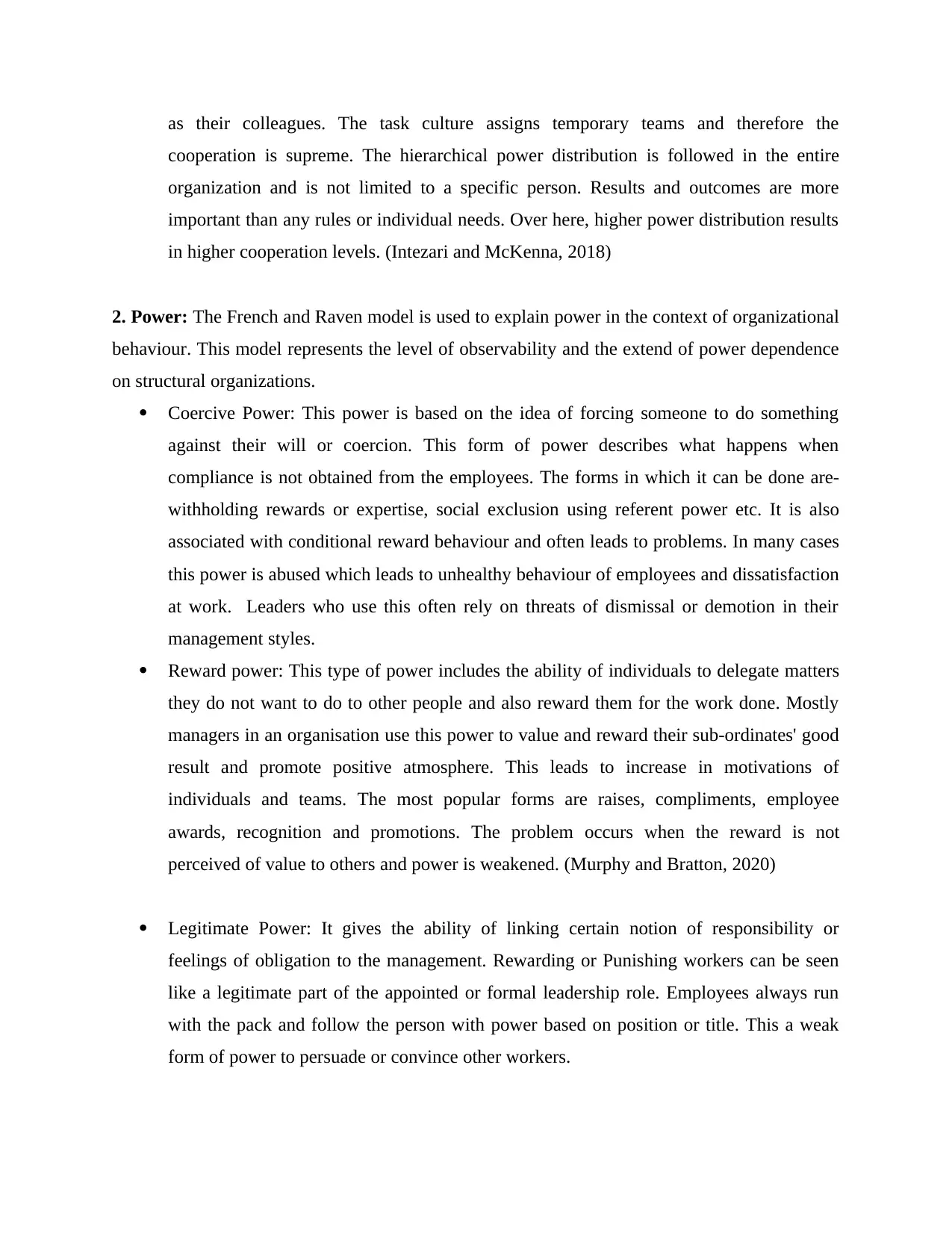
as their colleagues. The task culture assigns temporary teams and therefore the
cooperation is supreme. The hierarchical power distribution is followed in the entire
organization and is not limited to a specific person. Results and outcomes are more
important than any rules or individual needs. Over here, higher power distribution results
in higher cooperation levels. (Intezari and McKenna, 2018)
2. Power: The French and Raven model is used to explain power in the context of organizational
behaviour. This model represents the level of observability and the extend of power dependence
on structural organizations.
Coercive Power: This power is based on the idea of forcing someone to do something
against their will or coercion. This form of power describes what happens when
compliance is not obtained from the employees. The forms in which it can be done are-
withholding rewards or expertise, social exclusion using referent power etc. It is also
associated with conditional reward behaviour and often leads to problems. In many cases
this power is abused which leads to unhealthy behaviour of employees and dissatisfaction
at work. Leaders who use this often rely on threats of dismissal or demotion in their
management styles.
Reward power: This type of power includes the ability of individuals to delegate matters
they do not want to do to other people and also reward them for the work done. Mostly
managers in an organisation use this power to value and reward their sub-ordinates' good
result and promote positive atmosphere. This leads to increase in motivations of
individuals and teams. The most popular forms are raises, compliments, employee
awards, recognition and promotions. The problem occurs when the reward is not
perceived of value to others and power is weakened. (Murphy and Bratton, 2020)
Legitimate Power: It gives the ability of linking certain notion of responsibility or
feelings of obligation to the management. Rewarding or Punishing workers can be seen
like a legitimate part of the appointed or formal leadership role. Employees always run
with the pack and follow the person with power based on position or title. This a weak
form of power to persuade or convince other workers.
cooperation is supreme. The hierarchical power distribution is followed in the entire
organization and is not limited to a specific person. Results and outcomes are more
important than any rules or individual needs. Over here, higher power distribution results
in higher cooperation levels. (Intezari and McKenna, 2018)
2. Power: The French and Raven model is used to explain power in the context of organizational
behaviour. This model represents the level of observability and the extend of power dependence
on structural organizations.
Coercive Power: This power is based on the idea of forcing someone to do something
against their will or coercion. This form of power describes what happens when
compliance is not obtained from the employees. The forms in which it can be done are-
withholding rewards or expertise, social exclusion using referent power etc. It is also
associated with conditional reward behaviour and often leads to problems. In many cases
this power is abused which leads to unhealthy behaviour of employees and dissatisfaction
at work. Leaders who use this often rely on threats of dismissal or demotion in their
management styles.
Reward power: This type of power includes the ability of individuals to delegate matters
they do not want to do to other people and also reward them for the work done. Mostly
managers in an organisation use this power to value and reward their sub-ordinates' good
result and promote positive atmosphere. This leads to increase in motivations of
individuals and teams. The most popular forms are raises, compliments, employee
awards, recognition and promotions. The problem occurs when the reward is not
perceived of value to others and power is weakened. (Murphy and Bratton, 2020)
Legitimate Power: It gives the ability of linking certain notion of responsibility or
feelings of obligation to the management. Rewarding or Punishing workers can be seen
like a legitimate part of the appointed or formal leadership role. Employees always run
with the pack and follow the person with power based on position or title. This a weak
form of power to persuade or convince other workers.
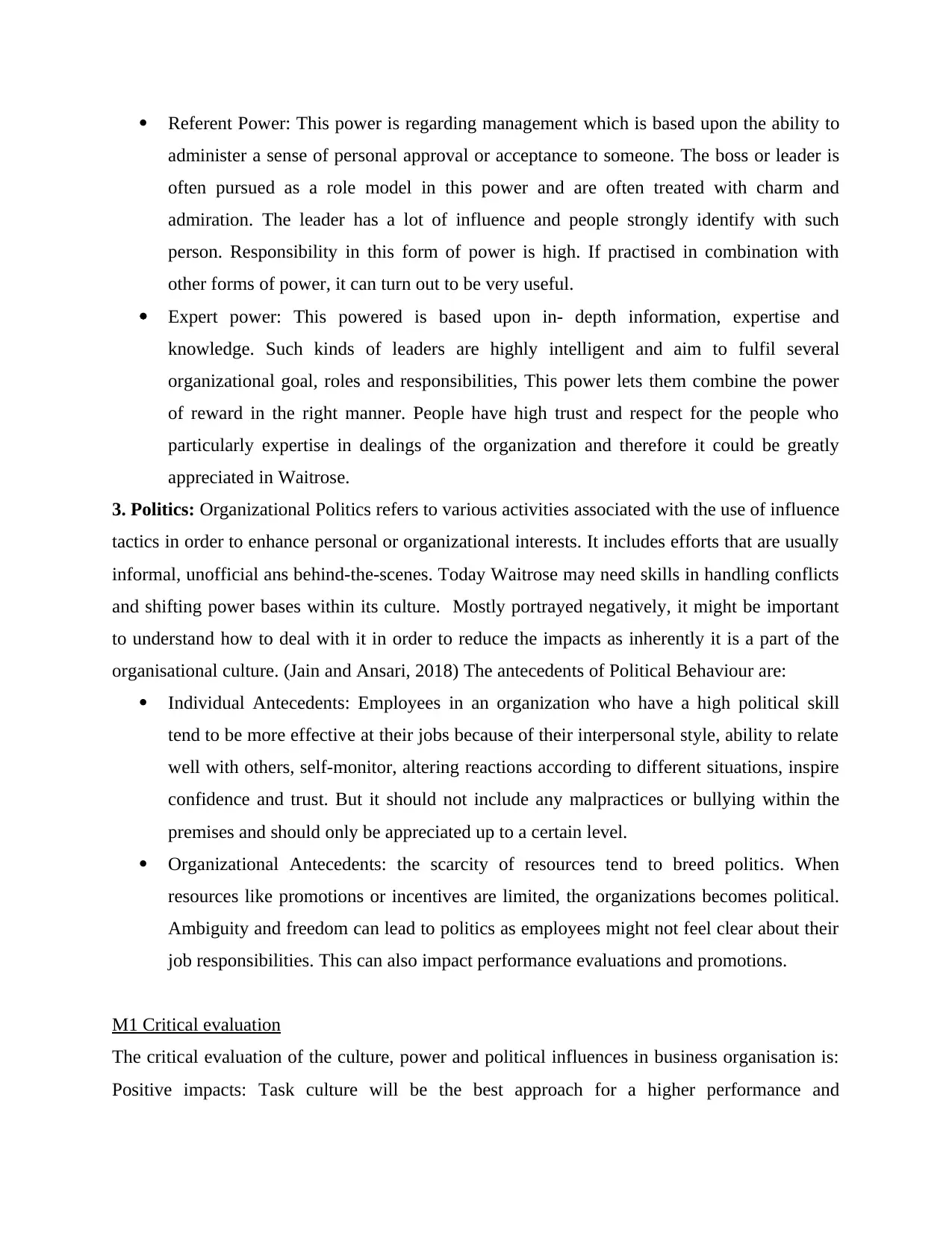
Referent Power: This power is regarding management which is based upon the ability to
administer a sense of personal approval or acceptance to someone. The boss or leader is
often pursued as a role model in this power and are often treated with charm and
admiration. The leader has a lot of influence and people strongly identify with such
person. Responsibility in this form of power is high. If practised in combination with
other forms of power, it can turn out to be very useful.
Expert power: This powered is based upon in- depth information, expertise and
knowledge. Such kinds of leaders are highly intelligent and aim to fulfil several
organizational goal, roles and responsibilities, This power lets them combine the power
of reward in the right manner. People have high trust and respect for the people who
particularly expertise in dealings of the organization and therefore it could be greatly
appreciated in Waitrose.
3. Politics: Organizational Politics refers to various activities associated with the use of influence
tactics in order to enhance personal or organizational interests. It includes efforts that are usually
informal, unofficial ans behind-the-scenes. Today Waitrose may need skills in handling conflicts
and shifting power bases within its culture. Mostly portrayed negatively, it might be important
to understand how to deal with it in order to reduce the impacts as inherently it is a part of the
organisational culture. (Jain and Ansari, 2018) The antecedents of Political Behaviour are:
Individual Antecedents: Employees in an organization who have a high political skill
tend to be more effective at their jobs because of their interpersonal style, ability to relate
well with others, self-monitor, altering reactions according to different situations, inspire
confidence and trust. But it should not include any malpractices or bullying within the
premises and should only be appreciated up to a certain level.
Organizational Antecedents: the scarcity of resources tend to breed politics. When
resources like promotions or incentives are limited, the organizations becomes political.
Ambiguity and freedom can lead to politics as employees might not feel clear about their
job responsibilities. This can also impact performance evaluations and promotions.
M1 Critical evaluation
The critical evaluation of the culture, power and political influences in business organisation is:
Positive impacts: Task culture will be the best approach for a higher performance and
administer a sense of personal approval or acceptance to someone. The boss or leader is
often pursued as a role model in this power and are often treated with charm and
admiration. The leader has a lot of influence and people strongly identify with such
person. Responsibility in this form of power is high. If practised in combination with
other forms of power, it can turn out to be very useful.
Expert power: This powered is based upon in- depth information, expertise and
knowledge. Such kinds of leaders are highly intelligent and aim to fulfil several
organizational goal, roles and responsibilities, This power lets them combine the power
of reward in the right manner. People have high trust and respect for the people who
particularly expertise in dealings of the organization and therefore it could be greatly
appreciated in Waitrose.
3. Politics: Organizational Politics refers to various activities associated with the use of influence
tactics in order to enhance personal or organizational interests. It includes efforts that are usually
informal, unofficial ans behind-the-scenes. Today Waitrose may need skills in handling conflicts
and shifting power bases within its culture. Mostly portrayed negatively, it might be important
to understand how to deal with it in order to reduce the impacts as inherently it is a part of the
organisational culture. (Jain and Ansari, 2018) The antecedents of Political Behaviour are:
Individual Antecedents: Employees in an organization who have a high political skill
tend to be more effective at their jobs because of their interpersonal style, ability to relate
well with others, self-monitor, altering reactions according to different situations, inspire
confidence and trust. But it should not include any malpractices or bullying within the
premises and should only be appreciated up to a certain level.
Organizational Antecedents: the scarcity of resources tend to breed politics. When
resources like promotions or incentives are limited, the organizations becomes political.
Ambiguity and freedom can lead to politics as employees might not feel clear about their
job responsibilities. This can also impact performance evaluations and promotions.
M1 Critical evaluation
The critical evaluation of the culture, power and political influences in business organisation is:
Positive impacts: Task culture will be the best approach for a higher performance and
⊘ This is a preview!⊘
Do you want full access?
Subscribe today to unlock all pages.

Trusted by 1+ million students worldwide
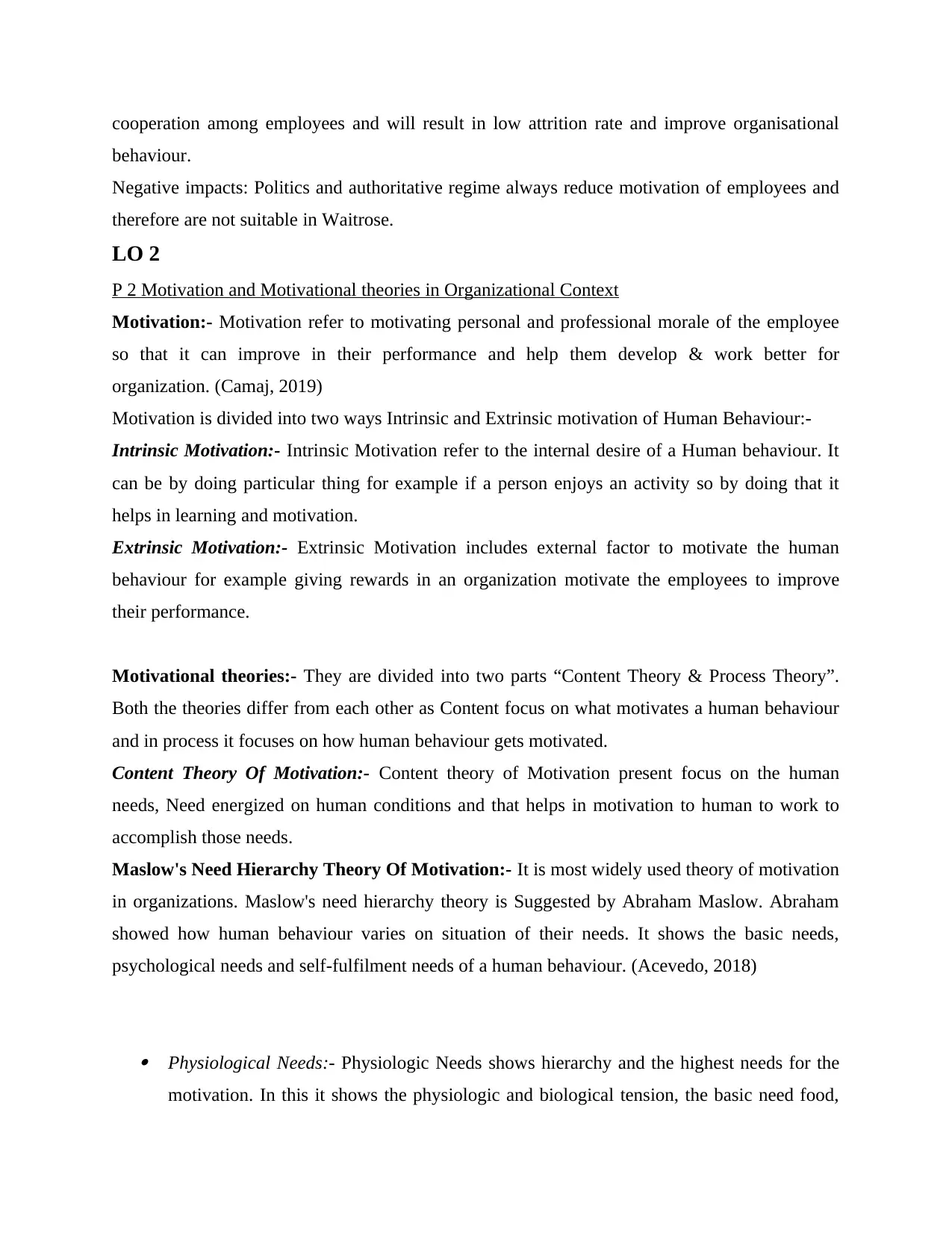
cooperation among employees and will result in low attrition rate and improve organisational
behaviour.
Negative impacts: Politics and authoritative regime always reduce motivation of employees and
therefore are not suitable in Waitrose.
LO 2
P 2 Motivation and Motivational theories in Organizational Context
Motivation:- Motivation refer to motivating personal and professional morale of the employee
so that it can improve in their performance and help them develop & work better for
organization. (Camaj, 2019)
Motivation is divided into two ways Intrinsic and Extrinsic motivation of Human Behaviour:-
Intrinsic Motivation:- Intrinsic Motivation refer to the internal desire of a Human behaviour. It
can be by doing particular thing for example if a person enjoys an activity so by doing that it
helps in learning and motivation.
Extrinsic Motivation:- Extrinsic Motivation includes external factor to motivate the human
behaviour for example giving rewards in an organization motivate the employees to improve
their performance.
Motivational theories:- They are divided into two parts “Content Theory & Process Theory”.
Both the theories differ from each other as Content focus on what motivates a human behaviour
and in process it focuses on how human behaviour gets motivated.
Content Theory Of Motivation:- Content theory of Motivation present focus on the human
needs, Need energized on human conditions and that helps in motivation to human to work to
accomplish those needs.
Maslow's Need Hierarchy Theory Of Motivation:- It is most widely used theory of motivation
in organizations. Maslow's need hierarchy theory is Suggested by Abraham Maslow. Abraham
showed how human behaviour varies on situation of their needs. It shows the basic needs,
psychological needs and self-fulfilment needs of a human behaviour. (Acevedo, 2018)
Physiological Needs:- Physiologic Needs shows hierarchy and the highest needs for the
motivation. In this it shows the physiologic and biological tension, the basic need food,
behaviour.
Negative impacts: Politics and authoritative regime always reduce motivation of employees and
therefore are not suitable in Waitrose.
LO 2
P 2 Motivation and Motivational theories in Organizational Context
Motivation:- Motivation refer to motivating personal and professional morale of the employee
so that it can improve in their performance and help them develop & work better for
organization. (Camaj, 2019)
Motivation is divided into two ways Intrinsic and Extrinsic motivation of Human Behaviour:-
Intrinsic Motivation:- Intrinsic Motivation refer to the internal desire of a Human behaviour. It
can be by doing particular thing for example if a person enjoys an activity so by doing that it
helps in learning and motivation.
Extrinsic Motivation:- Extrinsic Motivation includes external factor to motivate the human
behaviour for example giving rewards in an organization motivate the employees to improve
their performance.
Motivational theories:- They are divided into two parts “Content Theory & Process Theory”.
Both the theories differ from each other as Content focus on what motivates a human behaviour
and in process it focuses on how human behaviour gets motivated.
Content Theory Of Motivation:- Content theory of Motivation present focus on the human
needs, Need energized on human conditions and that helps in motivation to human to work to
accomplish those needs.
Maslow's Need Hierarchy Theory Of Motivation:- It is most widely used theory of motivation
in organizations. Maslow's need hierarchy theory is Suggested by Abraham Maslow. Abraham
showed how human behaviour varies on situation of their needs. It shows the basic needs,
psychological needs and self-fulfilment needs of a human behaviour. (Acevedo, 2018)
Physiological Needs:- Physiologic Needs shows hierarchy and the highest needs for the
motivation. In this it shows the physiologic and biological tension, the basic need food,
Paraphrase This Document
Need a fresh take? Get an instant paraphrase of this document with our AI Paraphraser
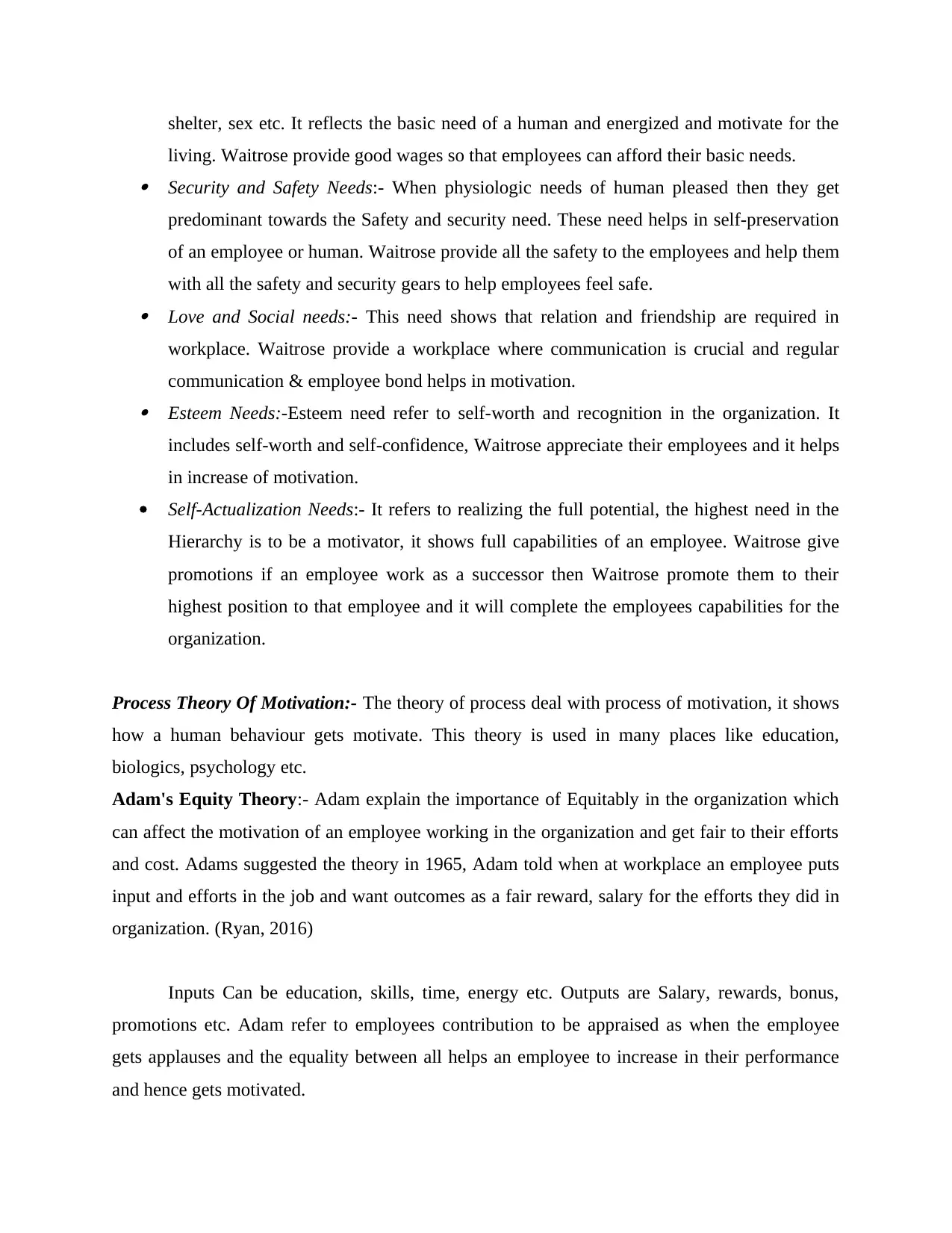
shelter, sex etc. It reflects the basic need of a human and energized and motivate for the
living. Waitrose provide good wages so that employees can afford their basic needs. Security and Safety Needs:- When physiologic needs of human pleased then they get
predominant towards the Safety and security need. These need helps in self-preservation
of an employee or human. Waitrose provide all the safety to the employees and help them
with all the safety and security gears to help employees feel safe. Love and Social needs:- This need shows that relation and friendship are required in
workplace. Waitrose provide a workplace where communication is crucial and regular
communication & employee bond helps in motivation. Esteem Needs:-Esteem need refer to self-worth and recognition in the organization. It
includes self-worth and self-confidence, Waitrose appreciate their employees and it helps
in increase of motivation.
Self-Actualization Needs:- It refers to realizing the full potential, the highest need in the
Hierarchy is to be a motivator, it shows full capabilities of an employee. Waitrose give
promotions if an employee work as a successor then Waitrose promote them to their
highest position to that employee and it will complete the employees capabilities for the
organization.
Process Theory Of Motivation:- The theory of process deal with process of motivation, it shows
how a human behaviour gets motivate. This theory is used in many places like education,
biologics, psychology etc.
Adam's Equity Theory:- Adam explain the importance of Equitably in the organization which
can affect the motivation of an employee working in the organization and get fair to their efforts
and cost. Adams suggested the theory in 1965, Adam told when at workplace an employee puts
input and efforts in the job and want outcomes as a fair reward, salary for the efforts they did in
organization. (Ryan, 2016)
Inputs Can be education, skills, time, energy etc. Outputs are Salary, rewards, bonus,
promotions etc. Adam refer to employees contribution to be appraised as when the employee
gets applauses and the equality between all helps an employee to increase in their performance
and hence gets motivated.
living. Waitrose provide good wages so that employees can afford their basic needs. Security and Safety Needs:- When physiologic needs of human pleased then they get
predominant towards the Safety and security need. These need helps in self-preservation
of an employee or human. Waitrose provide all the safety to the employees and help them
with all the safety and security gears to help employees feel safe. Love and Social needs:- This need shows that relation and friendship are required in
workplace. Waitrose provide a workplace where communication is crucial and regular
communication & employee bond helps in motivation. Esteem Needs:-Esteem need refer to self-worth and recognition in the organization. It
includes self-worth and self-confidence, Waitrose appreciate their employees and it helps
in increase of motivation.
Self-Actualization Needs:- It refers to realizing the full potential, the highest need in the
Hierarchy is to be a motivator, it shows full capabilities of an employee. Waitrose give
promotions if an employee work as a successor then Waitrose promote them to their
highest position to that employee and it will complete the employees capabilities for the
organization.
Process Theory Of Motivation:- The theory of process deal with process of motivation, it shows
how a human behaviour gets motivate. This theory is used in many places like education,
biologics, psychology etc.
Adam's Equity Theory:- Adam explain the importance of Equitably in the organization which
can affect the motivation of an employee working in the organization and get fair to their efforts
and cost. Adams suggested the theory in 1965, Adam told when at workplace an employee puts
input and efforts in the job and want outcomes as a fair reward, salary for the efforts they did in
organization. (Ryan, 2016)
Inputs Can be education, skills, time, energy etc. Outputs are Salary, rewards, bonus,
promotions etc. Adam refer to employees contribution to be appraised as when the employee
gets applauses and the equality between all helps an employee to increase in their performance
and hence gets motivated.
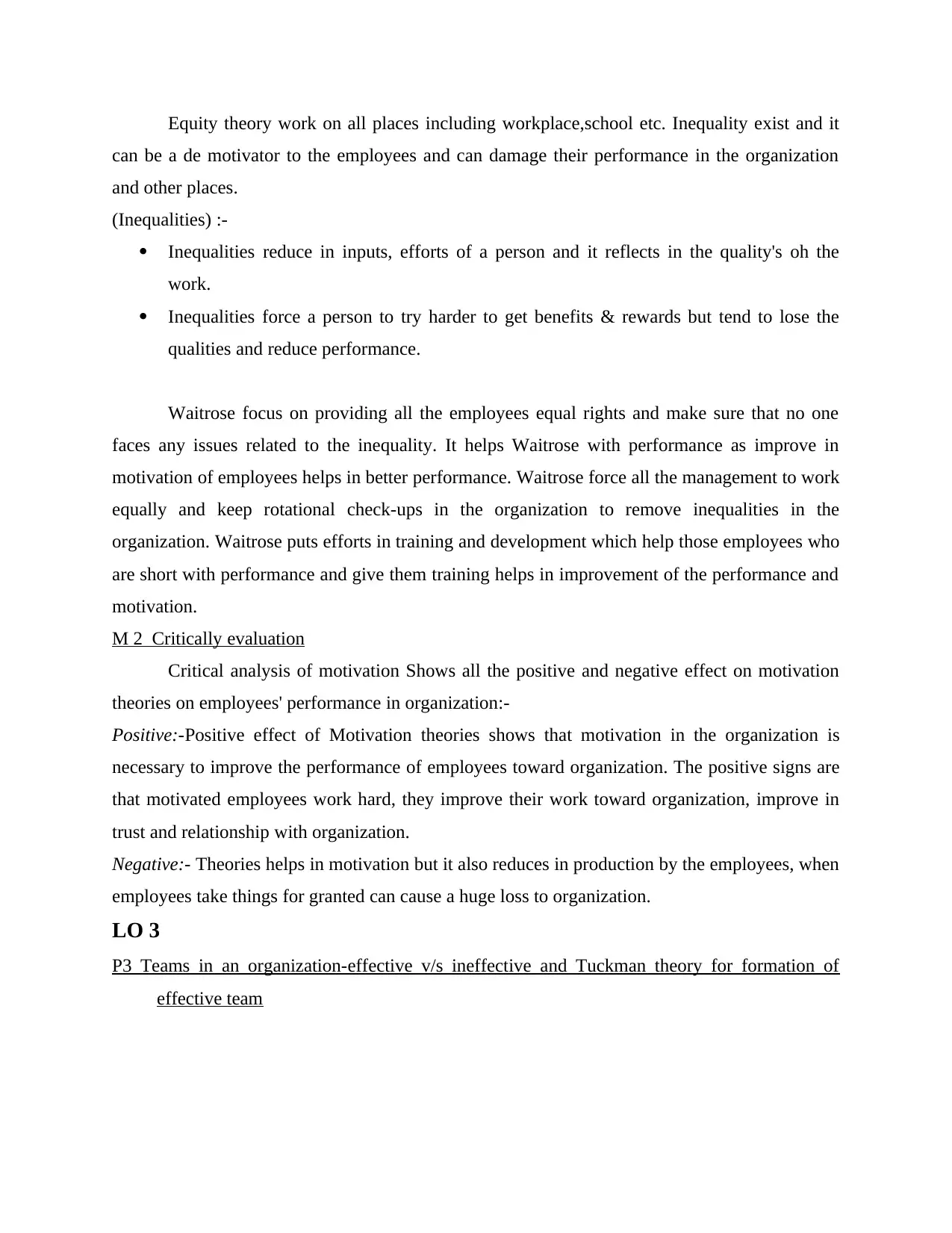
Equity theory work on all places including workplace,school etc. Inequality exist and it
can be a de motivator to the employees and can damage their performance in the organization
and other places.
(Inequalities) :-
Inequalities reduce in inputs, efforts of a person and it reflects in the quality's oh the
work.
Inequalities force a person to try harder to get benefits & rewards but tend to lose the
qualities and reduce performance.
Waitrose focus on providing all the employees equal rights and make sure that no one
faces any issues related to the inequality. It helps Waitrose with performance as improve in
motivation of employees helps in better performance. Waitrose force all the management to work
equally and keep rotational check-ups in the organization to remove inequalities in the
organization. Waitrose puts efforts in training and development which help those employees who
are short with performance and give them training helps in improvement of the performance and
motivation.
M 2 Critically evaluation
Critical analysis of motivation Shows all the positive and negative effect on motivation
theories on employees' performance in organization:-
Positive:-Positive effect of Motivation theories shows that motivation in the organization is
necessary to improve the performance of employees toward organization. The positive signs are
that motivated employees work hard, they improve their work toward organization, improve in
trust and relationship with organization.
Negative:- Theories helps in motivation but it also reduces in production by the employees, when
employees take things for granted can cause a huge loss to organization.
LO 3
P3 Teams in an organization-effective v/s ineffective and Tuckman theory for formation of
effective team
can be a de motivator to the employees and can damage their performance in the organization
and other places.
(Inequalities) :-
Inequalities reduce in inputs, efforts of a person and it reflects in the quality's oh the
work.
Inequalities force a person to try harder to get benefits & rewards but tend to lose the
qualities and reduce performance.
Waitrose focus on providing all the employees equal rights and make sure that no one
faces any issues related to the inequality. It helps Waitrose with performance as improve in
motivation of employees helps in better performance. Waitrose force all the management to work
equally and keep rotational check-ups in the organization to remove inequalities in the
organization. Waitrose puts efforts in training and development which help those employees who
are short with performance and give them training helps in improvement of the performance and
motivation.
M 2 Critically evaluation
Critical analysis of motivation Shows all the positive and negative effect on motivation
theories on employees' performance in organization:-
Positive:-Positive effect of Motivation theories shows that motivation in the organization is
necessary to improve the performance of employees toward organization. The positive signs are
that motivated employees work hard, they improve their work toward organization, improve in
trust and relationship with organization.
Negative:- Theories helps in motivation but it also reduces in production by the employees, when
employees take things for granted can cause a huge loss to organization.
LO 3
P3 Teams in an organization-effective v/s ineffective and Tuckman theory for formation of
effective team
⊘ This is a preview!⊘
Do you want full access?
Subscribe today to unlock all pages.

Trusted by 1+ million students worldwide
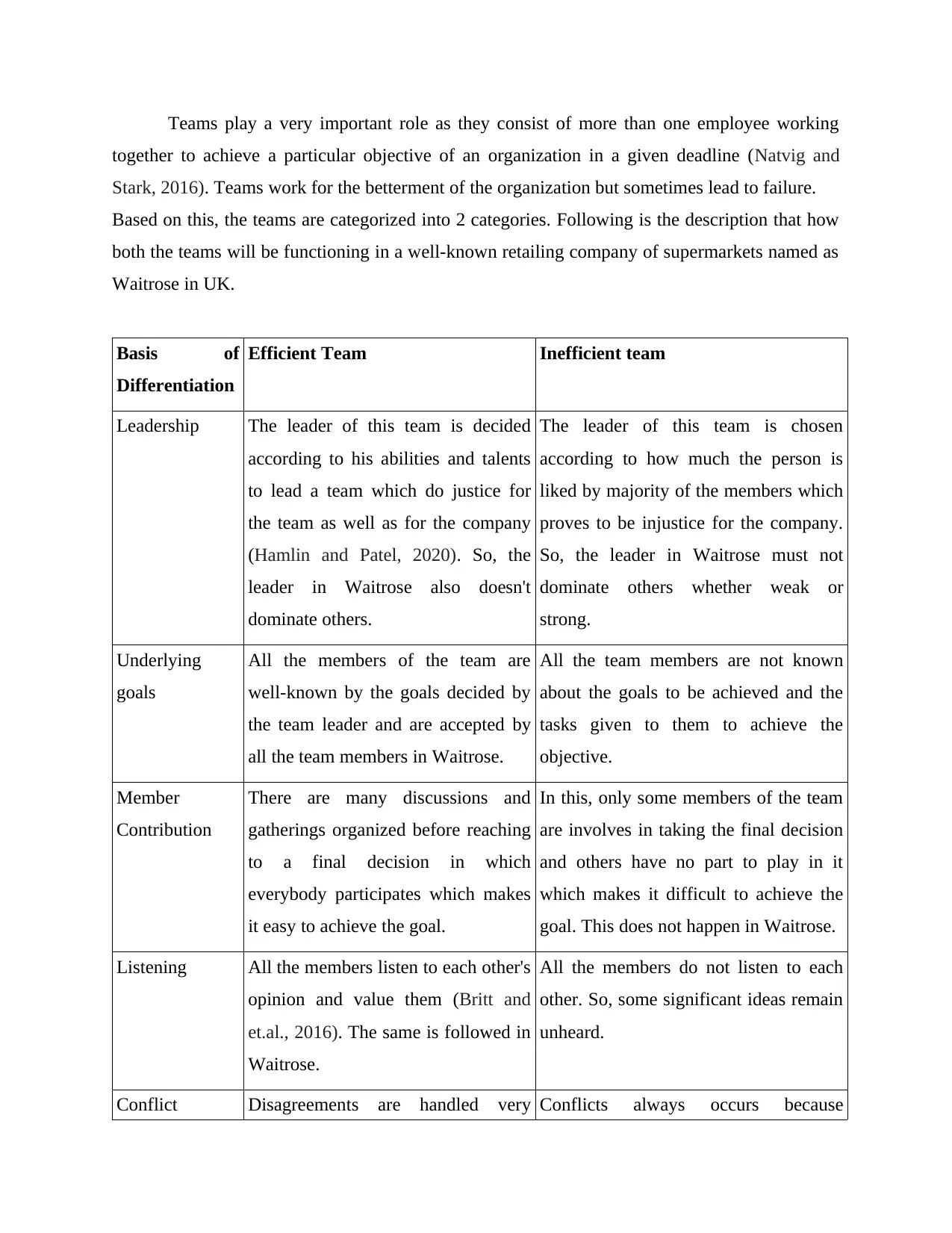
Teams play a very important role as they consist of more than one employee working
together to achieve a particular objective of an organization in a given deadline (Natvig and
Stark, 2016). Teams work for the betterment of the organization but sometimes lead to failure.
Based on this, the teams are categorized into 2 categories. Following is the description that how
both the teams will be functioning in a well-known retailing company of supermarkets named as
Waitrose in UK.
Basis of
Differentiation
Efficient Team Inefficient team
Leadership The leader of this team is decided
according to his abilities and talents
to lead a team which do justice for
the team as well as for the company
(Hamlin and Patel, 2020). So, the
leader in Waitrose also doesn't
dominate others.
The leader of this team is chosen
according to how much the person is
liked by majority of the members which
proves to be injustice for the company.
So, the leader in Waitrose must not
dominate others whether weak or
strong.
Underlying
goals
All the members of the team are
well-known by the goals decided by
the team leader and are accepted by
all the team members in Waitrose.
All the team members are not known
about the goals to be achieved and the
tasks given to them to achieve the
objective.
Member
Contribution
There are many discussions and
gatherings organized before reaching
to a final decision in which
everybody participates which makes
it easy to achieve the goal.
In this, only some members of the team
are involves in taking the final decision
and others have no part to play in it
which makes it difficult to achieve the
goal. This does not happen in Waitrose.
Listening All the members listen to each other's
opinion and value them (Britt and
et.al., 2016). The same is followed in
Waitrose.
All the members do not listen to each
other. So, some significant ideas remain
unheard.
Conflict Disagreements are handled very Conflicts always occurs because
together to achieve a particular objective of an organization in a given deadline (Natvig and
Stark, 2016). Teams work for the betterment of the organization but sometimes lead to failure.
Based on this, the teams are categorized into 2 categories. Following is the description that how
both the teams will be functioning in a well-known retailing company of supermarkets named as
Waitrose in UK.
Basis of
Differentiation
Efficient Team Inefficient team
Leadership The leader of this team is decided
according to his abilities and talents
to lead a team which do justice for
the team as well as for the company
(Hamlin and Patel, 2020). So, the
leader in Waitrose also doesn't
dominate others.
The leader of this team is chosen
according to how much the person is
liked by majority of the members which
proves to be injustice for the company.
So, the leader in Waitrose must not
dominate others whether weak or
strong.
Underlying
goals
All the members of the team are
well-known by the goals decided by
the team leader and are accepted by
all the team members in Waitrose.
All the team members are not known
about the goals to be achieved and the
tasks given to them to achieve the
objective.
Member
Contribution
There are many discussions and
gatherings organized before reaching
to a final decision in which
everybody participates which makes
it easy to achieve the goal.
In this, only some members of the team
are involves in taking the final decision
and others have no part to play in it
which makes it difficult to achieve the
goal. This does not happen in Waitrose.
Listening All the members listen to each other's
opinion and value them (Britt and
et.al., 2016). The same is followed in
Waitrose.
All the members do not listen to each
other. So, some significant ideas remain
unheard.
Conflict Disagreements are handled very Conflicts always occurs because
Paraphrase This Document
Need a fresh take? Get an instant paraphrase of this document with our AI Paraphraser
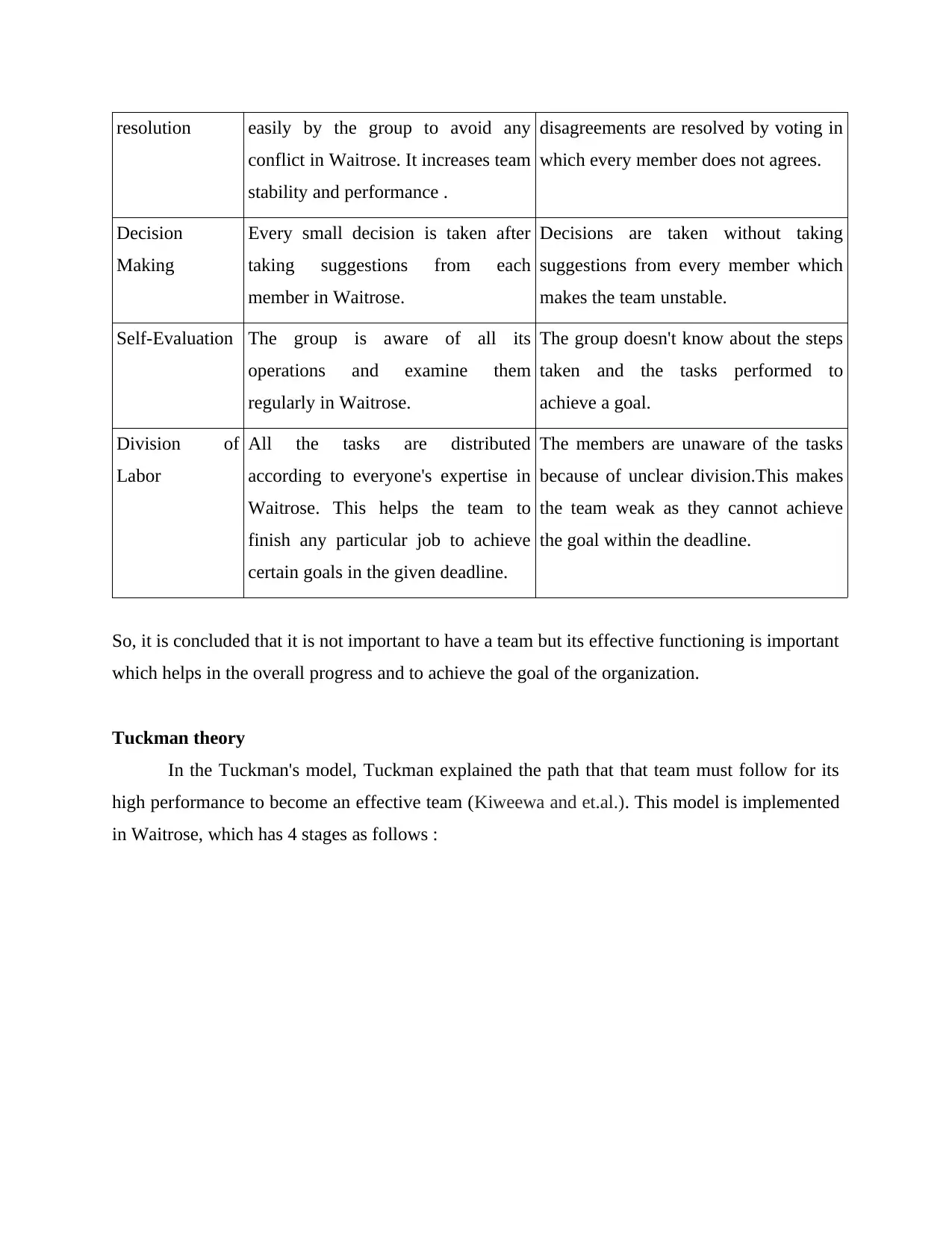
resolution easily by the group to avoid any
conflict in Waitrose. It increases team
stability and performance .
disagreements are resolved by voting in
which every member does not agrees.
Decision
Making
Every small decision is taken after
taking suggestions from each
member in Waitrose.
Decisions are taken without taking
suggestions from every member which
makes the team unstable.
Self-Evaluation The group is aware of all its
operations and examine them
regularly in Waitrose.
The group doesn't know about the steps
taken and the tasks performed to
achieve a goal.
Division of
Labor
All the tasks are distributed
according to everyone's expertise in
Waitrose. This helps the team to
finish any particular job to achieve
certain goals in the given deadline.
The members are unaware of the tasks
because of unclear division.This makes
the team weak as they cannot achieve
the goal within the deadline.
So, it is concluded that it is not important to have a team but its effective functioning is important
which helps in the overall progress and to achieve the goal of the organization.
Tuckman theory
In the Tuckman's model, Tuckman explained the path that that team must follow for its
high performance to become an effective team (Kiweewa and et.al.). This model is implemented
in Waitrose, which has 4 stages as follows :
conflict in Waitrose. It increases team
stability and performance .
disagreements are resolved by voting in
which every member does not agrees.
Decision
Making
Every small decision is taken after
taking suggestions from each
member in Waitrose.
Decisions are taken without taking
suggestions from every member which
makes the team unstable.
Self-Evaluation The group is aware of all its
operations and examine them
regularly in Waitrose.
The group doesn't know about the steps
taken and the tasks performed to
achieve a goal.
Division of
Labor
All the tasks are distributed
according to everyone's expertise in
Waitrose. This helps the team to
finish any particular job to achieve
certain goals in the given deadline.
The members are unaware of the tasks
because of unclear division.This makes
the team weak as they cannot achieve
the goal within the deadline.
So, it is concluded that it is not important to have a team but its effective functioning is important
which helps in the overall progress and to achieve the goal of the organization.
Tuckman theory
In the Tuckman's model, Tuckman explained the path that that team must follow for its
high performance to become an effective team (Kiweewa and et.al.). This model is implemented
in Waitrose, which has 4 stages as follows :
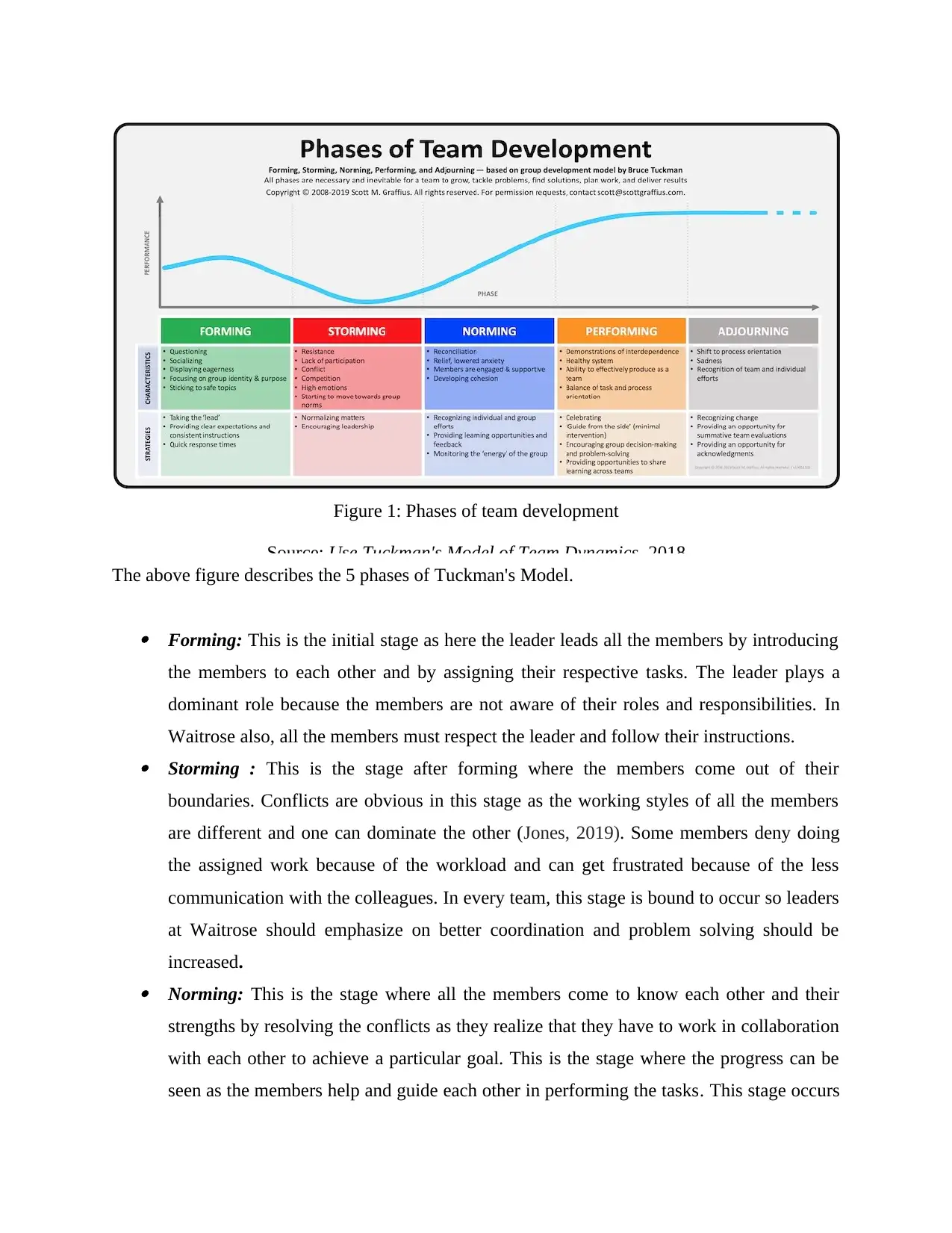
The above figure describes the 5 phases of Tuckman's Model.
Forming: This is the initial stage as here the leader leads all the members by introducing
the members to each other and by assigning their respective tasks. The leader plays a
dominant role because the members are not aware of their roles and responsibilities. In
Waitrose also, all the members must respect the leader and follow their instructions. Storming : This is the stage after forming where the members come out of their
boundaries. Conflicts are obvious in this stage as the working styles of all the members
are different and one can dominate the other (Jones, 2019). Some members deny doing
the assigned work because of the workload and can get frustrated because of the less
communication with the colleagues. In every team, this stage is bound to occur so leaders
at Waitrose should emphasize on better coordination and problem solving should be
increased. Norming: This is the stage where all the members come to know each other and their
strengths by resolving the conflicts as they realize that they have to work in collaboration
with each other to achieve a particular goal. This is the stage where the progress can be
seen as the members help and guide each other in performing the tasks. This stage occurs
Figure 1: Phases of team development
Source: Use Tuckman's Model of Team Dynamics, 2018
Forming: This is the initial stage as here the leader leads all the members by introducing
the members to each other and by assigning their respective tasks. The leader plays a
dominant role because the members are not aware of their roles and responsibilities. In
Waitrose also, all the members must respect the leader and follow their instructions. Storming : This is the stage after forming where the members come out of their
boundaries. Conflicts are obvious in this stage as the working styles of all the members
are different and one can dominate the other (Jones, 2019). Some members deny doing
the assigned work because of the workload and can get frustrated because of the less
communication with the colleagues. In every team, this stage is bound to occur so leaders
at Waitrose should emphasize on better coordination and problem solving should be
increased. Norming: This is the stage where all the members come to know each other and their
strengths by resolving the conflicts as they realize that they have to work in collaboration
with each other to achieve a particular goal. This is the stage where the progress can be
seen as the members help and guide each other in performing the tasks. This stage occurs
Figure 1: Phases of team development
Source: Use Tuckman's Model of Team Dynamics, 2018
⊘ This is a preview!⊘
Do you want full access?
Subscribe today to unlock all pages.

Trusted by 1+ million students worldwide
1 out of 18
Related Documents
Your All-in-One AI-Powered Toolkit for Academic Success.
+13062052269
info@desklib.com
Available 24*7 on WhatsApp / Email
![[object Object]](/_next/static/media/star-bottom.7253800d.svg)
Unlock your academic potential
Copyright © 2020–2026 A2Z Services. All Rights Reserved. Developed and managed by ZUCOL.





